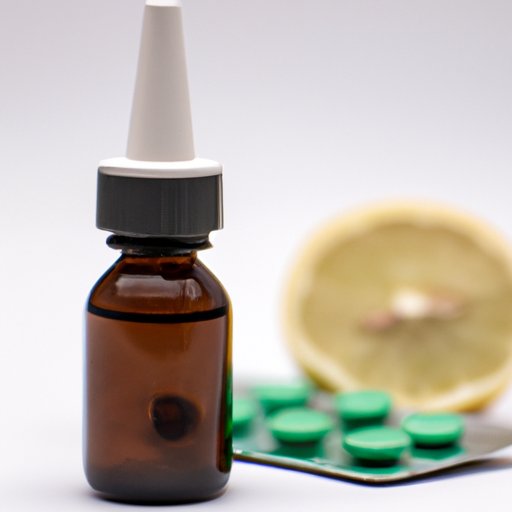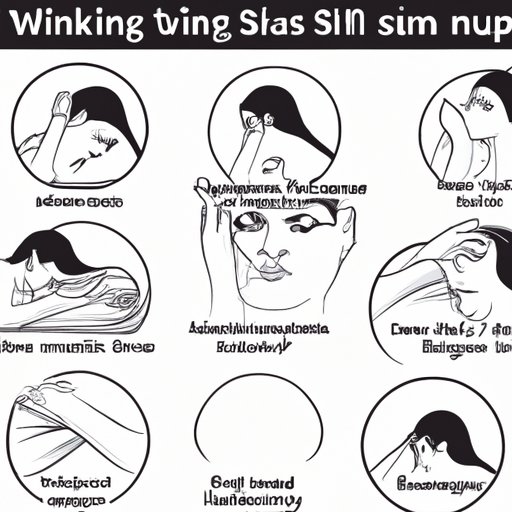
I. Introduction
Do you have difficulty breathing and experience facial pain or pressure which does not go away? You may be experiencing a sinus infection. Also known as sinusitis, a sinus infection is a common condition that occurs when the cavities around your nasal passages, or sinuses, become inflamed or swollen. In this article, we explore the importance of treating a sinus infection, effective home remedies, medications, and other methods to relieve symptoms.
II. Effective Home Remedies for Treating Sinus Infection
If you experience mild sinusitis symptoms, such as congestion or a runny nose, there are several effective home remedies that you can try:
A. Steam inhalation
Steam inhalation, a time-tested method of relieving sinus congestion, can provide relief. To do this, fill a bowl with hot water and inhale the steam. You can also add essential oils, such as eucalyptus or lavender, to further enhance the effects of steam inhalation.
B. Nasal irrigation
Nasal irrigation involves flushing out your nasal passages with a saline solution. This helps relieve congestion by removing excess mucus and irritants. You can use a neti pot, a squeeze bottle, or a nasal irrigator, which can be purchased from a drugstore.
C. Warm compress
Placing a warm compress over your sinuses can help relieve pain and pressure. To make a warm compress, soak a towel in warm water and place it over your forehead and nose.
D. Rest and hydration
Rest and hydration are key to treating a sinus infection. Be sure to drink plenty of fluids, such as water and herbal teas, to help thin out mucus and keep your sinuses hydrated.
E. Essential oils
Essential oils, such as peppermint, eucalyptus, and tea tree oil, can help alleviate symptoms of sinusitis. You can apply a few drops of essential oil to a tissue or use a diffuser to inhale the scent.
F. Herbal teas
Drinking herbal teas can help soothe sore throats and alleviate congestion. Chamomile, elderberry, and ginger tea are just a few of the many teas that can provide relief.
III. The Do’s and Don’ts of Treating a Sinus Infection
When treating a sinus infection, there are some crucial do’s and don’ts that you should keep in mind:
A. Do: Manage symptoms promptly
If you experience symptoms of a sinus infection, such as congestion, facial pain, or fever, seek treatment promptly. This can help prevent the infection from worsening and developing into a more serious condition.
B. Don’t: Rely solely on antibiotics
While antibiotics can be effective in treating bacterial sinusitis, they are not always necessary. If your symptoms are mild, home remedies and over-the-counter medications may be sufficient.
C. Do: Take preventative measures
You can prevent sinus infections by practicing good hygiene, such as washing your hands frequently and avoiding contact with people who are sick. Allergy-proofing your environment, avoiding smoking, and staying hydrated can also help.
D. Don’t: Avoid medical attention if symptoms worsen
If your symptoms worsen or do not improve with home remedies, seek medical attention promptly. This can help prevent the infection from developing into a more severe condition, such as pneumonia or meningitis.
IV. Natural Remedies to Alleviate Symptoms of Sinus Infection
In addition to home remedies and medications, natural remedies can also provide relief. Here are some natural remedies to try:
A. Ginger root
Ginger has natural anti-inflammatory properties that can help relieve symptoms of sinusitis. You can steep ginger root in hot water to make a tea or mix it with honey and lemon to make a soothing drink.
B. Turmeric
Turmeric is another natural anti-inflammatory spice that can help alleviate sinusitis symptoms. You can drink turmeric tea or add it to your meals.
C. Apple cider vinegar
Apple cider vinegar has natural antibacterial properties that can help fight off sinus infections. You can mix apple cider vinegar with warm water and honey to make a tonic.
D. Eucalyptus oil
Eucalyptus oil has natural decongestant properties that can help relieve sinus congestion. You can add a few drops of eucalyptus oil to a warm compress or inhale its scent using a diffuser.
E. Lemon juice
Lemon juice contains vitamin C, which can help boost your immune system and fight off infections. You can drink lemon juice mixed with warm water and honey to help alleviate sinusitis symptoms.
F. Horseradish
Horseradish contains natural compounds that can help clear up nasal passages and relieve sinusitis symptoms. You can mix horseradish with honey and lemon juice to make a soothing drink or add it to your meals.
V. Sinus Infection Treatment: What Medications to Take
If your sinus infection is severe or does not improve with home remedies, your doctor may prescribe medications to help alleviate your symptoms:
A. Antibiotics
If your sinus infection is caused by bacteria, your doctor may prescribe antibiotics to help clear up the infection. Make sure to take the antibiotics as directed and finish the entire course of treatment.
B. Decongestants
Decongestant medications, such as pseudoephedrine or oxymetazoline, can help relieve sinus congestion and pressure. However, these medications should be used sparingly and not for longer than three days, as they can cause rebound congestion.
C. Steroids
Steroid medications, such as prednisone, can help reduce inflammation in your sinuses and alleviate symptoms. However, these medications have side effects and should only be used under the supervision of a doctor.
D. Pain relievers
Pain relievers, such as acetaminophen or ibuprofen, can help relieve pain and reduce fever associated with sinusitis.

VI. 10 Traditional Methods to Relieve Sinus Pain and Pressure
Here are ten traditional methods to relieve sinus pain and pressure:
A. Apply a warm compress
A warm compress can help soothe sinus pain and pressure.
B. Drink plenty of fluids
Drinking plenty of fluids, such as water and herbal tea, can help thin out mucus and keep your sinuses hydrated.
C. Avoid irritants
Avoid irritants, such as cigarette smoke and pollution, which can aggravate your sinuses.
D. Get enough rest
Resting and getting enough sleep can help your body fight off infections and promote healing.
E. Use saline spray
Saline spray can help relieve nasal congestion and improve your breathing.
F. Increase humidity
Increasing the humidity in your home or office can help alleviate sinus pain and pressure.
G. Apply a cold compress
A cold compress can help reduce inflammation and alleviate sinus pain and pressure.
H. Elevate the head
Elevating your head can help relieve sinus pressure and promote drainage.
I. Use over-the-counter pain relievers
Over-the-counter pain relievers can help alleviate sinus pain and reduce fever associated with sinusitis.
J. Avoid nicotine and alcohol
Nicotine and alcohol can aggravate sinusitis symptoms and should be avoided.
VII. Topical Treatments to Ease Sinus Congestion and Drainage
Here are some topical treatments that can help ease sinus congestion and drainage:
A. Vapor rubs
Vapor rubs, such as Vicks VapoRub, can help relieve congestion and promote breathing.
B. Saline sprays
Saline sprays can help relieve nasal congestion and improve breathing.
C. Mentholated ointments
Mentholated ointments, such as Tiger Balm, can help relieve sinus pressure and promote drainage.
D. Neti pots
Neti pots can help flush out your sinuses and relieve congestion. However, make sure to use distilled or sterilized water to avoid infections.
E. Decongestant sprays
Decongestant sprays, such as Afrin, can help relieve congestion. However, these sprays should not be used for longer than three days, as they can cause rebound congestion.
VIII. Combining Traditional and Alternative Remedies to Treat Sinus Infection
Combining traditional and alternative remedies can provide an effective approach to treating sinus infections. Here are some benefits of combining treatments and tips for doing so:
A. Benefits of combining treatments
Combining treatments can help alleviate symptoms from different angles, providing more comprehensive relief.
B. Examples of combined remedies
You can combine traditional remedies, such as herbal teas and warm compresses, with natural remedies, such as essential oils and apple cider vinegar.
C. Tips for combining traditional and alternative remedies
It is important to consult with your doctor before combining treatments. Additionally, make sure to follow instructions carefully and avoid overuse of any remedies.
IX. Conclusion
Sinus infections can be a painful and frustrating condition to deal with. However, with the right treatment and management, relief is possible. By combining effective home remedies, medications, and other methods, you can alleviate your symptoms and promote healing. Remember to seek medical attention if your symptoms worsen or do not improve with home remedies, and take preventative measures to avoid future infections.




